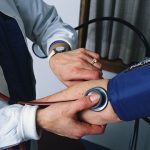(HealthDay News) — A sprained thumb occurs when ligaments stretch beyond their limits. The most common cause of a sprained thumb is falling onto an outstretched hand, the American Academy of Orthopaedic Surgeons says. Depending on the sprain’s severity, you may have bruising, tenderness and swelling around the base of your thumb. Difficulty grasping things also is common. For mild thumb sprains, the academy recommends the RICE protocol: Rest. Avoid using your hand for 48 hours. Ice. Use cold packs 20 minutes at a time, multiple times per day. Compression. Wear an elastic bandage to reduce swelling. Elevation. Raise your hand higher than your heart as often as possible.
A little about: Weekly Gravy
All Sauce from Weekly Gravy:
Slow Down! Eating Too Fast Can Pile on the Pounds

Has your hectic lifestyle turned you into someone who gulps down meals? People who eat quickly tend to eat moreand have a higher body mass index (a measure of body fat based on height and weight) than those who eat slowly. People who eat slowly feel full sooner and eat less in the process. Part of the reason for this is the time it takes for your brain to get key messages from your digestive system. Conventional wisdom says that’s about 20 minutes, and one study found that slowing down to 30 minutes is even more effective. But that means you have to find ways to really stretch out your meals. Tricks like eating with your non-dominant hand can help a lot, but eating fast can be a hard habit to break. One high-tech solution is a commercially available smart fork, a utensil that registers your eating speed and sends a signal, with a vibration and a flash of light, if you eat too quickly. Participants in an experimental study found that it was comfortable to hold and did a good job of making them more aware of their eating speed. But you can also try to slow down on your own with a regular fork: Just put it down and count to 10 between each and every bite. Reinforce the slower eating habit with… read on >
Stretches for Calves, Hamstrings and Quads

Stretching your leg muscles can improve your flexibility and prevent injury. Here are three stretches that you can do every day and at every age. Start with a calf stretch. Stand at arm’s length from a wall and place your palms flat on the wall at shoulder height for support. Now take one big step backward with one leg. Keep that leg straight as you bend the front knee. Lean forward, but keep your back heel planted firmly on the floor. You should feel the stretch in your lower leg. Hold for 20 to 30 seconds, then switch legs and repeat. Repeat three to five times with each leg. Now move to a hamstring stretch. Lie flat on your back and extend one leg straight up to the ceiling. Loop an exercise band around the ball of that foot and hold the ends of the band firmly around both hands. Now pull on the band to create tension, drawing your foot slightly toward your head. Hold for 20 to 30 seconds, then switch legs and repeat. Repeat three to five times with each leg. Finish with a quad stretch. Stand a few feet in front of a step or low stool. Extend one leg behind you so that you are resting that foot on the step. Bend your front knee slightly without letting it extend… read on >
Poor Asthma Control Tied to Worse School Performance

Kids with poorly controlled asthma struggle in school, especially those who are ethnic minorities, a new study reports. Researchers evaluated asthma and allergy status, lung function and school performance of 216 black, Hispanic (Latino) and white children in a U.S. city. Those with a greater number of daily asthma symptoms had more absences, less school work completed and poorer quality work, according to the study published March 11 in Annals of Allergy, Asthma and Immunology, the journal of the American College of Allergy, Asthma and Immunology (ACAAI). “We found associations between poor asthma status, poorer asthma control, lower lung function, more asthma symptoms and decline in academic performance,” lead author Daphne Koinis-Mitchell said in an ACAAI news release. “These associations were stronger in ethnic minority children, particularly Latino children,” she added. Koinis-Mitchell is a research professor of pediatrics, psychiatry and human behavior at Brown University in Providence, R.I. Poor asthma control could help identify children who might be at risk for problems at school, according to the researchers. The same team previously found that urban Hispanic children with asthma have special sources of stress. “Factors such as higher levels of fear of asthma, language barriers, stress related to fitting in to the culture, poorer symptom perception, greater concerns regarding medications and lower medication adherence may put Latinos at greater risk for poor academic performance,” Koinis-Mitchell… read on >
Smoking While Pregnant Sends SIDS Risk Soaring

Smoking during pregnancy is never a good idea, but new research shows it might double the risk of a baby dying from sudden infant death syndrome (SIDS). “Any maternal smoking during pregnancy — even just one cigarette a day — doubles the risk of sudden unexpected infant death [SUID, another term for unexplained infant deaths],” said lead researcher Tatiana Anderson. She is a fellow at Seattle Children’s Research Institute, Center for Integrative Brain Research. Doctors should strongly encourage women to give up smoking during pregnancy, or if they can’t quit, to smoke less, she said. Each cigarette smoked increases the risk of SIDS, Anderson added. If women didn’t smoke during pregnancy, the rate of SIDS in the United States could be cut by 22 percent, preventing some 800 infant deaths a year, according to the new report published online March 11 in the journal Pediatrics. Although 55 percent of the women in the study who smoked didn’t stop or cut back during pregnancy, those who did markedly reduced the risk of SIDS, Anderson said. Specifically, women who cut down on their smoking by the third trimester reduced the risk of SIDS by 12 percent. Women who quit by the third trimester reduced the risk by 23 percent, the researchers found. For the study, Anderson and her colleagues collected data on more than 19,000 SUID cases.… read on >
Many Parents Think Vaping Around Kids Is Fine

Many parents who smoke try to shield their kids from their unhealthy habit — but those who vape may not take the same precautions, a new study suggests. The study surveyed over 700 parents who smoked cigarettes, used e-cigarettes or both. The researchers found that most — regardless of their product of choice — had a “strict” smoke-free policy at home. Yet few e-cigarette users had banned vaping from their homes: Only around one-quarter had done so — versus 73 percent of parents who only smoked cigarettes. Altogether, the findings suggest that parents who vape are unaware of the risks to their kids, said senior researcher Dr. Jonathan Winickoff, of Massachusetts General Hospital, in Boston. “We really think parents are being misled by ‘Big Tobacco,’” Winickoff said. E-cigarettes are electronic devices that work by heating a liquid that contains nicotine, flavorings and other chemicals. There’s no tobacco, but the devices produce an aerosol that sends fine particles and chemicals into the air. According to Linda Richter, director of policy research and analysis for the New York-based nonprofit Center on Addiction, “The aerosol produced by vaping is by no means ‘harmless’ water vapor.” Being around the aerosol can irritate the eyes, throat and lungs — and may worsen asthma or any other respiratory problems a child has, said Richter, who was not involved in the study.… read on >
Health Tip: Concussion Recovery for Children
(HealthDay News) — A concussion is a brain injury that results from an impact to the head. While it usually isn’t life-threatening, a concussion can cause short-term and long-term problems. Parents and caregivers of concussed children should take an active role in their recovery, the New York State Department of Health says. The agency suggests: Make sure the child is well rested. Make sure the child avoids high-risk and high-speed activities. Do not give medicine the pediatrician hasn’t approved. Share information with those who interact with the child to help them understand the child’s needs.
Control Your Blood Pressure to Head Off Serious Health Problems

High blood pressure is one of the most common medical conditions in the United States and one of the most treatable, an expert says. High blood pressure affects a third of adults ages 40-59 and nearly two-thirds of those 60 and older. “It’s something we check at almost every medical appointment, no matter what,” said Dr. Kevin Wile, a family medicine physician at Penn State Health in Hershey. “When we can detect it early, we can avoid complications.” Blood pressure measures how much force the blood places on artery walls each time a heart beats (systolic, the top number) and between beats (diastolic, the bottom number). New guidelines adopted last year by the American Heart Association and other health organizations define high blood pressure as 130/80 and over. Moderately high blood pressure rarely causes symptoms, so people are often unaware they have it. But those with severely high blood pressure may have headaches, fatigue, confusion, vision changes and chest pain. Those are “big red flags,” according to Wile. “If left untreated, it can lead to increased risk of a heart attack, heart failure, stroke and vision loss,” Wile warned in a Penn State news release. “It essentially has the ability to affect almost any organ in the body if you go a long time without controlling it.” Besides medication, treatment often means addressing lifestyle issues… read on >
Health Tip: Energy Drink Safety
(HealthDay News) — While energy drinks are promoted as products that increase energy and enhance performance, they also can put users at risk. From 2007 to 2011, energy-drink related emergency room visits doubled. Overconsumption of energy drinks can cause a host of issues, the U.S> National Institutes of Health says. The NIH warns that excessive consumption can result in: Sleep disturbances. Anxiety. Digestive problems. Dehydration.
Try This Healthy Makeover for a Favorite Fast Food

Take-out pizza is the ultimate fast food — gooey cheese, salty sauce, fatty pepperoni, all baked on top of what’s basically white bread. But there’s no need to feel guilty about enjoying a hot slice once you’ve mastered a nutritious and delicious pizza makeover. Add just a few ingredients to your weekly shopping list. It can take less time than a trip to the drive-thru, but now your pizza will be healthy, too. Here’s what you’ll need: Choose a high quality 100-percent whole wheat crust to get fiber with every slice. Look for low-sodium jarred marinara sauce or simply buy a large can of diced tomatoes. Stock up on plenty of low-cal, high-fiber veggies like mushrooms, red bell pepper and baby spinach. If you like your pizza spicy, replace fatty pepperoni with red pepper flakes for heat. Low-fat mozzarella might seem a better way to go, but you’re only saving a few calories per ounce and, for most people, dairy fat isn’t the taboo it used to be. Just use less of it to limit the saturated fat. Even in small amounts, full-fat mozzarella tastes richer and helps you feel full. Try to find a freshly made ball of mozzarella. The pre-shredded bagged varieties have unwanted ingredients used to keep the shreds from clumping. (If you need to cut calories for weight loss, you can… read on >









